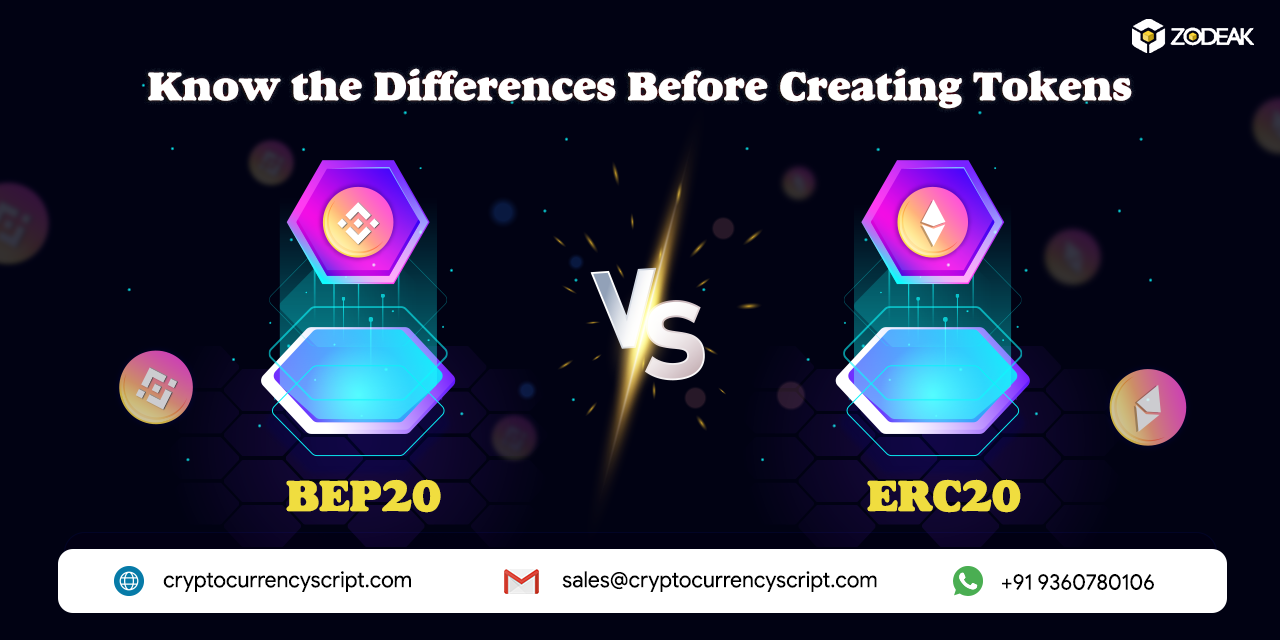Hello readers! Nice to see you again! Today in this blog we are going to see a battle of BEP20 Vs ERC20. Before that, we must first know what are the crypto token basics and what is the token standard.
Let’s get started…
If you ask me or someone in the crypto space what a crypto token is, you will get different answers from everyone. Some will say it’s another bubble to grab the internet’s focus like PooCoin, Dogecoin, or Shiba Inu. Some will say it’s the denomination of the digital currency. At least, it is up to the user to decide what a crypto token is.
Here, we only focus on sharing information about tokens and their standards that helps startups or individuals to gain clarity.
What is a Crypto Token?
Generally, crypto tokens reside on the blockchain, which secures transactions using smart contracts and cryptography. Tokens are confusing with crypto Coins, but essentially they are not. Because crypto coin has its own blockchain to run on. Whereas the token is created on any public blockchain that perhaps holds its own coins.
Crypto tokens are mainly used for project fundraising on ICO, voting for proposals on DAO, etc. Also, it can be used for specific applications linked to the project on the blockchain that hosts them. Most crypto startups today are more interested in creating tokens than coins for their business. This is because creating crypto tokens is easier and cheaper than creating cryptocurrency.
Types of Crypto Tokens
There are many different types of crypto tokens, but the most commonly used are utility, security, payment, and governance. These are classified based on several factors including code, use case, and functions.
Utility Tokens – Used for participation in the platform and not for investment. It provides access to specific products or services within a blockchain ecosystem.
Security Tokens – Subject to regulatory frameworks and security laws. They represent traditional financial securities, such as shares or bonds, but in a digital form.
Payment Tokens – Similar to cryptocurrencies and are primarily use as a medium of exchange. They facilitate transactions and can use to make purchases or as a store of value.
Governance Tokens – Grant holders voting rights and decision-making power within a decentralized organization or blockchain. They use to shape the direction of a project, such as making decisions or allocating funds.
Usually, crypto tokens we create are store in digital wallets and can use for various purposes or trade on crypto exchanges. Their value varies based on supply and demand dynamics, market sentiment, and the underlying project.
Hope you understand the concept of crypto tokens and their types now it’s time to understand the token standards next.
What is a crypto Token Standard?
Crypto token standard is a set of rules or blueprints or guidelines that define how a specific type of token should be created, managed, and run on a blockchain. These standards ensure that tokens built on the same blockchain can easily exchange and interact with various applications and users.
These Token standards typically stipulate requirements for
- Token Minting process
- Token’s total supply limit
- Token metadata
- Token issuance
- Exchanging of tokens
- Transaction execution
- Ownership management
By adhering to these standards, developers can ensure compatibility and interoperability between different dApps, wallets, and exchanges, making it simpler for users to engage with tokens on various platforms.
Generally, there are many token standards for creating fungible tokens. Fungible tokens are interchangeable and equivalent to one another. This tells that each token has its own fixed value and one can exchange for another token exactly as it is.
Among all standards, the most well-known and widely used token standards are the Ethereum ERC20 token and the Binance BEP20. Both standards define a common set of functions and interfaces that enable the creation of fungible tokens on their blockchain.
Hope you understand what the crypto token standard is. Many people in the crypto space are confusing about Ethereum or Binance standards for their business.
Now, let’s see the difference between BEP20 Vs ERC20.
Differences: BEP20 Vs ERC20 Standard
BEP20 and ERC20 are both token standards for creating and implementing tokens on the blockchain. Although they have similarities, there are some differences between the two standards are discussing below.
Here is the table of BEP20 Vs ERC20 for your better understanding:
| Points of Difference | BEP20 | ERC20 |
| Definition | BEP20 allows the creation of smart contract-backed tokens that can be used with other products and services on Binance | ERC20 guidelines for tokens specify how they can be used and the creation of smart contract-enabled tokens on Ethereum |
| Blockchain | The BEP20 token standard belongs to Binance Smart Chain, developed by Binance | ERC20 token standard belongs to the Ethereum blockchain which is the most widely adopted network |
| Development Language | Typically developed using the Solidity programming language, similar to ERC20 tokens | Developed using the Solidity programming language, which is the primary language for smart contracts on Ethereum |
| Network Compatibility | They are compatible with the BSC and can be used in DApps built on the Binance ecosystem | They are compatible with Ethereum and can be used in various Ethereum-based DApps, wallets, and exchanges |
| Transaction Fee | These tokens generally have lower transaction fees compared to ERC20 tokens on the Ethereum network | ERC20 tokens on the Ethereum have higher transaction fees due to the network’s congestion and higher demand |
| Interoperability | BEP20 is not directly interoperable with ERC20 or other non-BEP20 standards. However, bridging solutions exist to facilitate cross-chain transfers | ERC20 tokens are interoperable with other ERC20 tokens and can be easily integrated with other Ethereum-based protocols and smart contracts |
| Token Creation | To create and deploy BEP20 tokens, developers need to follow the BEP20 token standard and deploy the smart contract on the BSC | Developers must follow the ERC20 standard and implement the smart contract on Ethereum to create and deploy tokens. |
Final Words
The most important thing to remember is that ERC20 and BEP20 token development and their respective chains achieve different goals. Both token standards provide access to a wide variety of dApps and smart contract-enabled tokens.
Finally, choosing which token standard to use depends on the business or individual requirements and whether or not the dApp you want to engage with supports it. Before planning to create tokens for your crypto-based business, it is always better to consult with experts in this field.
Create top-notch tokens to expand the business to greater heights!





